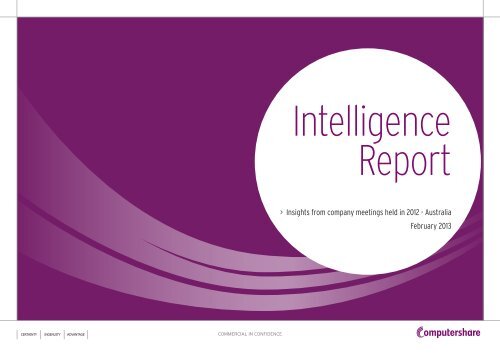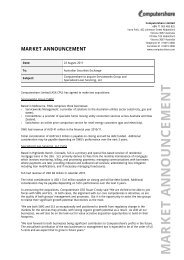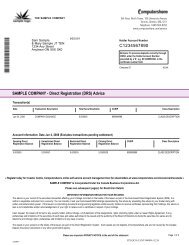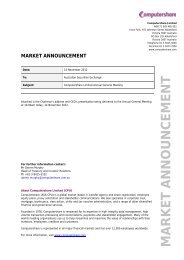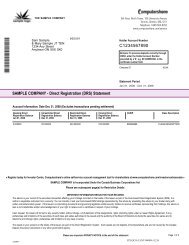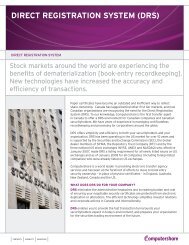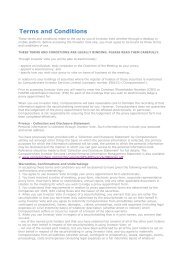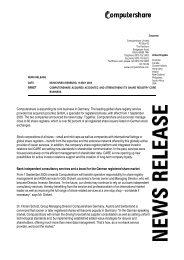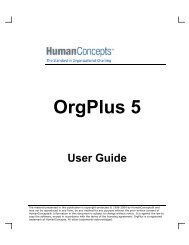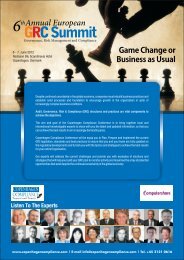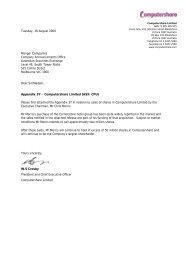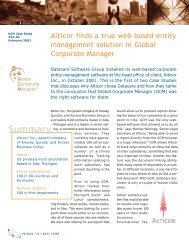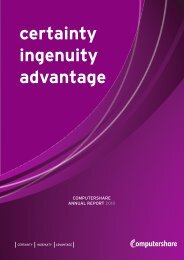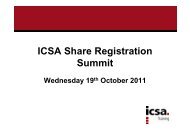to download the Computershare Investor Services Intelligence Report.
to download the Computershare Investor Services Intelligence Report.
to download the Computershare Investor Services Intelligence Report.
Create successful ePaper yourself
Turn your PDF publications into a flip-book with our unique Google optimized e-Paper software.
<strong>Intelligence</strong><strong>Report</strong>> Insights from company meetings held in 2012 - AustraliaFebruary 2013certainty ingenuity advantageCOMMERCIAL IN CONFIDENCE1
Informe a los AccionistasInforme a la Junta Generalde Accionistas delBanco de Guayaquil S.A.correspondiente al ejercicio del año 2011De acuerdo a lo dispues<strong>to</strong>en los estatu<strong>to</strong>s delBanco de Guayaquil S.A.tenemos el agrado de presentarel Informe de Laborescorrespondiente al año 2011
Insights from company meetings held in 2012Attendance and votingA significantly smaller proportion of securityholders are attending meetings for companies in <strong>the</strong> ASX200 (0.13% in 2012) than isobserved for all companies. The difference is even more apparent in ASX50 companies where only 0.09% of securityholders walkedthrough <strong>the</strong> venue door in 2012. It appears that attendance may still not have yet hit its low.Proportion of securityholders attending by ASX indexASX 500.11%0.11%0.11%201220110.09%0.14%2010ASX 1000.12%0.12%0.13%20090.15%ASX 2000.13%0.14%0.13%0.00 0.03 0.06 0.09 0.12 0.152009 2010 20112012Figure 02: Larger companies see a significantly smaller proportion of shareholders walk through <strong>the</strong> venue door.5
Insights from company meetings held in 2012Attendance and votingVoting participation continues <strong>to</strong> increase in <strong>the</strong> ASX200Our analysis of <strong>Computershare</strong> client meetings shows that <strong>the</strong>re is a two-speed voting pattern; while voting in companies ‘across <strong>the</strong>board’ resumed its downward trend in 2012, voting participation is in fact much healthier in larger companies.<strong>Computershare</strong> clients in <strong>the</strong> ASX200 have seen a marked increase in <strong>the</strong> proportion of issued capital voted in <strong>the</strong> last four years;from 48.2% in 2009 <strong>to</strong> 62.0% in 2012, indicating that institutional holders are increasingly taking up <strong>the</strong>ir vote in larger companies.Proportion of issued capital voted by ASX index (all meeting types)ASX 50ASX 100ASX 20051.2%56.2%57.0%63.2%50.9%48.2%58.6%59.8%63.3%57.5%58.8%62.0%2012201120102009ASX O<strong>the</strong>r42.1%41.4%42.3%36.5%0% 20% 40% 60% 80% 100%2009 2010 20112012Figure 03: Over <strong>the</strong> last four years, companies in <strong>the</strong> ASX200 have seen a marked increase in <strong>the</strong> issuedcapital voted across all meeting types.6
Insights from company meetings held in 2012Attendance and votingVoting ‘across <strong>the</strong> board’ appears <strong>to</strong> be resuming its downward trendIn 2012 <strong>the</strong> <strong>to</strong>tal number of securityholders voting across all <strong>Computershare</strong> client meetings slipped <strong>to</strong> 5.9%. The overall issuedcapital voted was 42.8%, <strong>the</strong> lowest level seen in <strong>the</strong> last four years. In 2011 we observed a marginal increase in voting whichpointed <strong>to</strong> a potential advance in securityholder engagement. However, an ‘across <strong>the</strong> board’ increase in engagement appears <strong>to</strong> bedebatable given <strong>the</strong> downward voting trend that resumed in 2012.Proportion of securityholders voting and issued capital voted (all meeting types)In a 2012 securityholdersurvey, <strong>Computershare</strong>found that nearly half <strong>the</strong>respondents who said that<strong>the</strong>y wouldn’t vote in 2012cited <strong>the</strong>ir small holding notmaking a difference as <strong>the</strong>reason.50%40%44.1%46.1% 46.3%42.8%“I am generally happy with<strong>the</strong> direction of <strong>the</strong> companyand if I become unhappy Iwill sell out.”30%SURVEY RESPONDENT20%10%7.5% 6.6% 6.9%5.9%0%2009201020112012Issued capital votedSecurityholders votingFigure 04: Voting for all meeting types appears <strong>to</strong> have resumed its downward trend in 2012.7
Insights from company meetings held in 2012Attendance and votingOver <strong>the</strong> last four years, Scheme Meetings and AGMs have typically attracted <strong>the</strong> largest proportion of votes by issued capital. In2012 <strong>the</strong> issued capital voted by meeting type was higher for Scheme Meetings (59%) than any o<strong>the</strong>r meeting type, followed byAGMs, with 47.4% of issued capital voted.Proportion of issued capital voted by type of meetingAnnualGeneralMeeting42.8%48.3%50.6%47.4%20122011GeneralMeeting31.2%37.0%33.3%31.4%2010200939.4%SchemeMeeting54.4%61.5%59.0%0% 10% 20% 30% 40% 50% 60% 70%2009 2010 20112012Figure 05: Scheme meetings followed by AGMs have attracted <strong>the</strong> largest proportion of votes by issued capital.8
Insights from company meetings held in 2012Attendance and votingFew companies have adopted direct votingNine <strong>Computershare</strong> clients (predominently in <strong>the</strong> ASX50) offered direct voting in 2012, down from ten in 2011. While adoptedby only a handful of companies, <strong>the</strong> proportion of securityholders who vote in meetings where direct voting is used tends <strong>to</strong> bemarginally higher than in companies who do not use this voting model. We also analysed companies before and after <strong>the</strong>y adopteddirect voting and observed no meaningful difference in voting participation.Proportion of securityholders who voted in meetings usingdirect voting vs. overall voting at all meetings in ASX508%7.5%6.8%7%6.4%6%6.5%6.2%5.4%5.9%5%5.3%4%2009201020112012Overall voting in ASX50Direct votingFigure 06: The proportion of securityholders who vote in meetings where direct voting is usedtends <strong>to</strong> be marginally higher than in companies who do not use this voting model.9
Insights from company meetings held in 2012Attendance and votingVoting reminders play an important role for companies who are looking <strong>to</strong> increase <strong>the</strong>ir overall voting participation. Companieswho issue a ‘reminder <strong>to</strong> vote’ <strong>to</strong> <strong>the</strong>ir securityholders in <strong>the</strong> days before <strong>the</strong> proxy close date see a noticeable increase in votingparticipation within a short time after <strong>the</strong> email communication is sent. A day after one company issued a reminder communicationin 2012, <strong>the</strong>y experienced a fivefold increase in <strong>the</strong> number of holders who voted online and an uplift of twelve times <strong>the</strong> issuedcapital received compared <strong>to</strong> <strong>the</strong> previous day.Companies who issued a voting reminder in 2012- proportion of securityholderswho voted and issued capital received prior <strong>to</strong> proxy close date80%70%60%50%40%30%20%10%0%18 days13 - 17 days8 - 12 days 4 - 7 days 3 days 2 days 1 days Proxy close dateBUSINESS DAYS FROM PROXY CLOSE DATE% of issued capital received % of securityholders votedFigure 08: Companies who issue a voting reminder in <strong>the</strong> days before <strong>the</strong> proxy close date see a noticeable increase in voting participation.11
Insights from company meetings held in 2012Attendance and votingOver-voting continues <strong>to</strong> cause headaches for issuersThere has been plenty of discussion recently across <strong>the</strong> industry and in <strong>the</strong> media regarding <strong>the</strong> issue of proxy ‘over-votes’. Overvotingoccurs when more shares are instructed <strong>to</strong> be voted than <strong>the</strong> actual number of shares owned by a registered securityholder.It can occur when <strong>the</strong>re is an imbalance between <strong>the</strong> perceived voting entitlements of individual inves<strong>to</strong>rs whose shares are pooledwith o<strong>the</strong>r inves<strong>to</strong>rs within a nominee holding and <strong>the</strong> actual (lesser) voting entitlements held by <strong>the</strong> nominee on <strong>the</strong> share register.The impact on issuers is significant; from meetings held in 2012, we identified 187 cases of over-voting affecting 117 issuers. Overvotingrepresented more than 20% of <strong>the</strong> issued capital voted for four companies and in <strong>the</strong> most extreme case, one issuer sawover-voting make up 56.8% its issued capital voted or 31.7% of its <strong>to</strong>tal issued capital.98.9% of <strong>the</strong> over-vote cases in 2012 were lodged via paper proxy forms. To encourage a reduction in paper proxies and comba<strong>to</strong>ver-voting, <strong>Computershare</strong> launched Intermediary Online in 2008; <strong>the</strong> only online service offered by a registry that is specificallydesigned <strong>to</strong> meet <strong>the</strong> needs of institutional inves<strong>to</strong>rs. Intermediary Online supports real-time proxy processing which means thatwhen a lodged vote causes a securityholding <strong>to</strong> move in<strong>to</strong> an over-vote position, an on-screen alert is immediately broadcast <strong>to</strong> <strong>the</strong>user. In addition, if an over-vote occurs sometime after lodgement of an electronic vote, <strong>the</strong> cus<strong>to</strong>dian or nominee receives an alertabout <strong>the</strong> over-vote via email.Chasing over-votes is a time consuming and time critical exercise. It requires significant rework for all parties, mostly in <strong>the</strong> lasttwo days prior <strong>to</strong> <strong>the</strong> proxy cut-off date. <strong>Computershare</strong> endeavours <strong>to</strong> contact any proxy agent who lodges an over-vote position.In only three of <strong>the</strong> 187 over-vote cases in 2012 were we not able <strong>to</strong> contact <strong>the</strong> lodging agent and resolve <strong>the</strong> issue. However, <strong>the</strong>impact on <strong>the</strong>se three cases was that votes had <strong>to</strong> bedisregarded in <strong>the</strong>ir entirety. We <strong>the</strong>n reviewed <strong>the</strong> resultsfor all resolutions put <strong>to</strong> meetings where <strong>the</strong>re was anover-vote, and found that <strong>the</strong> inclusion of <strong>the</strong> over-voteposition would not have changed <strong>the</strong> outcome in all threeinstances.In our recent submission <strong>to</strong> CAMAC’s review of ‘The AGMand shareholder engagement’, we discuss how <strong>the</strong> currentpractice of cus<strong>to</strong>dians and nominees holding institutionalinves<strong>to</strong>rs in pooled account structures ra<strong>the</strong>r than indesignated accounts named on <strong>the</strong> company register iscontributing <strong>to</strong> a number of market inefficiencies, including<strong>the</strong> issue of over-voting. The pooling of inves<strong>to</strong>rs in<strong>to</strong> oneaccount on <strong>the</strong> register means that over-voting cannotbe adjusted by a simple pro-rating down of votes ‘for’ or‘against’.What’s <strong>the</strong> differencebetween a ‘designated’ and‘pooled’ account?A pooled account is <strong>the</strong>combination of client assetsheld through an omnibusaccount in <strong>the</strong> name of <strong>the</strong>cus<strong>to</strong>dian or its nominee,ra<strong>the</strong>r than in individualaccounts for each underlyingclient. For example,HSBC Cus<strong>to</strong>dy Nominees(Australia) Limited orNational Nominees AustraliaLimited.A designated account is <strong>the</strong>segregation of underlyinginves<strong>to</strong>rs in<strong>to</strong> individualaccounts on <strong>the</strong> shareregister. For example,QIC Limited or INVIACus<strong>to</strong>dians Pty Limited.Designated or segregatedaccounts can be establishedwithin CHESS and directly on<strong>the</strong> share register, facilitatingdirect communications andvoting between companiesand shareholders.Figure 09: <strong>Computershare</strong>’s Intermediary Online supports real-time proxyprocessing which is helping <strong>to</strong> combat <strong>the</strong> incidence of over-voting.12
Insights from company meetings held in 2012Use of technologyA promotional flyer for <strong>the</strong> new module of Inves<strong>to</strong>rVote accompanied <strong>the</strong> AGM mailpacks sent out <strong>to</strong> <strong>the</strong> securityholders of twocompanies. This offline campaign proved <strong>to</strong> be effective, resulting in a higher proportion of securityholders lodging <strong>the</strong>ir proxy viamobile compared with <strong>the</strong> overall average of <strong>the</strong> pilot.After <strong>the</strong> success of 2012, mobile device voting will be available for all <strong>Computershare</strong> clients <strong>to</strong> offer <strong>to</strong> <strong>the</strong>ir securityholders in2013. With strong consumer uptake of mobile device technology in Australia, we expect <strong>to</strong> see a growing proportion of votes lodgedvia this channel in <strong>the</strong> future.In <strong>the</strong> lead up <strong>to</strong> <strong>the</strong>irAGM in May 2012, AMP’ssecurityholders becamesome of <strong>the</strong> first in Australia<strong>to</strong> lodge <strong>the</strong>ir proxy votesusing a mobile device.Scan here <strong>to</strong> go directly <strong>to</strong> <strong>the</strong>AMP mobile voting websiteOur new mobile voting website is designed specificallyfor smartphones, so you can now vote on <strong>the</strong> go.Simply scan <strong>the</strong> QR code above with your smartphoneor log on <strong>to</strong> www.inves<strong>to</strong>rvote.com.au from your phone.You will need <strong>the</strong> control number, holder number andpostcode for your shareholding. These can be found in<strong>the</strong> <strong>to</strong>p right corner of your enclosed proxy form.To scan <strong>the</strong> code above you need <strong>to</strong> have already <strong>download</strong>eda free QR code reader application <strong>to</strong> your smartphone.Figure 12: A convenient way <strong>to</strong> vote; securityholders simply need <strong>to</strong> scan a QR code <strong>to</strong> access <strong>Computershare</strong>’s mobile device proxy voting service.To learn more about this service click here.“This is about keeping AMP’sAGM contemporary andrelevant as shareholderschange <strong>the</strong> way <strong>the</strong>y viewand use information, andcommunicate with us. Thesite is easy <strong>to</strong> read anddesigned <strong>to</strong> suit mobiledevices ra<strong>the</strong>r than desk<strong>to</strong>pcomputers.”MARNIE REID – AMP HEAD OFSHAREHOLDER SERVICES15
Insights from company meetings held in 2012Use of technologyInstitutional inves<strong>to</strong>rs show strong support for straight-through processingAlthough institutional inves<strong>to</strong>rs who voted online in 2012 accounted for only 0.4% of securityholders, this small group certainlymade <strong>the</strong>ir presence felt by lodging proxies online for nearly a quarter of <strong>the</strong> <strong>to</strong>tal issued capital voted.Since our launch of Intermediary Online in 2008, <strong>Computershare</strong> is <strong>the</strong> only registry <strong>to</strong> offer an online service specifically forinstitutional inves<strong>to</strong>rs. This unique technology enables cus<strong>to</strong>dians and nominees who hold securities on behalf of institutions <strong>to</strong>swiftly lodge proxies electronically, ensuring straight-through processing for issuers’ largest inves<strong>to</strong>rs. Users receive an immediatevote confirmation upon lodgement and are able <strong>to</strong> run real-time proxy status reports.Accounting for only 8.9% of issued capital voted in 2010, volumes have nearly tripled in <strong>the</strong> last three years resulting inIntermediary Online processing 23.3% of <strong>the</strong> <strong>to</strong>tal issued capital voted in 2012.Securityholders who voted by channelIssued capital voted by channelInves<strong>to</strong>r VoteTraditionalIntermediary Online201015.7%84.2%0.1%2010Intermediary Online15.4%Traditional75.7%8.9%IntermediaTraditionalInves<strong>to</strong>r VoteInves<strong>to</strong>r Vo201117.0%82.7%0.3%20119.0%76.5%14.5%201220.8%78.8%0.4%201211.3%65.4%23.3%0% 10% 20% 30% 40% 50% 60% 70% 80% 90% 100%0% 10% 20% 30% 40% 50% 60% 70% 80% 90% 100%Inves<strong>to</strong>rVote*TraditionalIntermediary OnlineInves<strong>to</strong>rVote*TraditionalIntermediary Online* Includes mobile device votingFigure 13: 23.3% of all issued capital voted in 2012 was submitted via Intermediary Online, a <strong>Computershare</strong> web service designed <strong>to</strong> meet <strong>the</strong> unique needs ofinstitutional inves<strong>to</strong>rs.16
Insights from company meetings held in 2012Use of technologyUsing voting handsets at meetings maximises attendee experienceFaced with needing <strong>to</strong> hold two consecutive meetings on <strong>the</strong> same day in 2012, Woolworthsopted <strong>to</strong> use voting handsets instead of traditional voting cards, this allowed securityholders<strong>to</strong> register for both <strong>the</strong> AGM and General Meeting at <strong>the</strong> same time.IML, a <strong>Computershare</strong> company, and <strong>Computershare</strong> Inves<strong>to</strong>r <strong>Services</strong> worked closely with<strong>the</strong> company prior <strong>to</strong> <strong>the</strong> meetings, establishing <strong>the</strong> rules and pro<strong>to</strong>cols for voting anddetermining when results for each resolution would be available <strong>to</strong> view.At registration, hundreds of securityholders were swiftly provided with a personalisedsmartcard programmed with <strong>the</strong>ir specific voting privileges which was <strong>the</strong>n inserted in<strong>to</strong> anaccompanying IML Connec<strong>to</strong>r handset. When voting opened, attendees cast <strong>the</strong>ir votes using<strong>the</strong> handsets, which immediately recorded and processed <strong>the</strong> data and <strong>the</strong>n added it <strong>to</strong> <strong>the</strong><strong>to</strong>tal results.Using <strong>the</strong> handsets simplified <strong>the</strong> complex logistics associated with running two meetings,<strong>the</strong>reby providing comfort <strong>to</strong> Woolworths that voting was being managed efficiently. Thistechnology also ensured a better experience for <strong>the</strong>ir securityholders who did not need <strong>to</strong>re-register between meetings.“We’ve now used <strong>the</strong> handsetvoting system at <strong>the</strong> ANZ AGMsince 2006. It’s easy <strong>to</strong> use for<strong>the</strong> shareholder, and enables <strong>the</strong>votes cast electronically at <strong>the</strong>meeting <strong>to</strong> be tallied and displayedinstantly at <strong>the</strong> meeting – thisis a significant improvementcompared with using voting cardsand has most certainly enhanced<strong>the</strong> AGM ‘experience’ for those inattendance.”JOHN PRIESTLEY –ANZ COMPANY SECRETARYExtending <strong>the</strong> AGM <strong>to</strong> an online forumWhile current legislation does not specifically authorise companies <strong>to</strong> offer <strong>the</strong>ir securityholders <strong>the</strong> opportunity <strong>to</strong> participatein an online AGM, <strong>the</strong> Corporation and Markets Advisory Committee (CAMAC) will no doubt address this as part of <strong>the</strong>irrecommendations <strong>to</strong> <strong>the</strong> government in response <strong>to</strong> <strong>the</strong>ir review of <strong>the</strong> ‘The AGM and shareholder engagement’.We have observed <strong>the</strong> virtual AGM taken <strong>to</strong> <strong>the</strong> extreme in <strong>the</strong> United States, where some states permit online-only meetingsand as a result a degree of securityholder scepticism has emerged. For example, securityholders have expressed fears that <strong>the</strong>irquestions have been prioritised, rephrased and ignored or responses have been delayed <strong>to</strong> be answered outside <strong>the</strong> meeting, andare <strong>the</strong>refore not on public record. Concerns have also been expressed regarding <strong>the</strong> transparency of securityholder questions andmanagement’s answers, as well as whe<strong>the</strong>r or not securityholder questions asked online are visible <strong>to</strong> everyone at <strong>the</strong> meeting.Retail shareholders are adept withtechnology and open <strong>to</strong> beingengaged via digital channels.66% of respondents in a recent<strong>Computershare</strong> survey said that<strong>the</strong>y would participate in an onlineAGM if it was offered.In our submission <strong>to</strong> CAMAC, <strong>Computershare</strong> put forward our support for hybrid meetings – that is, a combination of <strong>the</strong> physicaland online AGM. We do caution however that it should ultimately be <strong>the</strong> company’s choice as <strong>to</strong> whe<strong>the</strong>r <strong>the</strong>y adopt this practice.<strong>Computershare</strong> is ready <strong>to</strong> offer its clients an online AGM service pending confirmation that securityholders are able <strong>to</strong> participatein a meeting via this channel. We will continue <strong>to</strong> participate in industry dialogue on this matter.17
Insights from company meetings held in 2012Voting on <strong>the</strong> remuneration reportVoting on <strong>the</strong> remuneration reportThe Corporations Amendment (Improving Accountability on Direc<strong>to</strong>r and Executive Remuneration) Bill was passed in July 2011. Thislegislation introduced <strong>the</strong> ‘two strikes’ rule which was designed <strong>to</strong> provide inves<strong>to</strong>rs with a greater say on executive remuneration.In 2012 <strong>the</strong> level of inves<strong>to</strong>r discontent about executive pay was higher in companies outside <strong>the</strong> ASX200 than in larger companies.An analysis of <strong>the</strong> proportion of votes lodged against <strong>the</strong> remuneration report shows that <strong>the</strong> average percentage was 5.5% in <strong>the</strong>ASX50 versus 7.4% for all companies outside <strong>the</strong> ASX200.Average proportion of votes cast against <strong>the</strong> remuneration report in 2012ASX505.5%ASX1006.9%ASX2007.1%ASX O<strong>the</strong>r7.4%0% 1% 2% 3% 4% 5% 6% 7% 8%Figure 14: Across <strong>the</strong> entire ASX, <strong>the</strong> proportion of votes cast against <strong>the</strong> remuneration report in 2012 was lower in larger companies than it was for those outside<strong>the</strong> ASX200.Data source: 2012 AGM results (all companies), Financial Review Business <strong>Intelligence</strong>, January 2013.18
Insights from company meetings held in 2012Voting on <strong>the</strong> remuneration reportFewer companies received a first strike in 2012 than in <strong>the</strong> previous yearIn 2012, 124 companies received ei<strong>the</strong>r a first or second strike compared with 114 companies receiving a first strike in 2011. However,it should be noted that in 2011 only AGMs held from July onwards were subject <strong>to</strong> <strong>the</strong> new rule.Looking across <strong>the</strong> entire ASX, 15 fewer companies received a first strike in 2012 (99) when compared <strong>to</strong> 2011 (114). Two thirds of <strong>the</strong>companies who suffered a first strike in 2012 received 25-49.9% of votes against <strong>the</strong>ir remuneration report resolution, with nine percent receiving more than 75% of votes against this resolution. The highest percentage of votes against <strong>the</strong> remuneration reportresolution for an individual company was 95%.First strike - how securityholders voted on <strong>the</strong> Remuneration <strong>Report</strong>75% VOTES AGAINST REMUNERATION REPORT25-49.9%50-74.9%162324662012201175-100%90 20 40 60 80 100NUMBER OF COMPANIES2011 2012Figure 15: 99 companies across <strong>the</strong> entire ASX received a first strike in 2012, 15 fewer than <strong>the</strong> previous year.Data source: 2012 AGM results (all companies), Financial Review Business <strong>Intelligence</strong>, January 2013.19
Insights from company meetings held in 2012Voting on <strong>the</strong> remuneration report25 companies received a second strike in 2012114 companies (just over 6% of <strong>the</strong> entire ASX) received a first strike in 2011. Ten companies who received a first strike in 2011 did nothold an AGM in 2012 for a variety of reasons including:> > ASX suspension / delisting> > Corporate structure changes as a result of a takeover or Scheme of Arrangement> > Liquidation> > ASIC extension granted <strong>to</strong> hold <strong>the</strong> AGM at a later dateInterestingly, we observed that 65 of <strong>the</strong> 104 companies facing a second strike who did hold an AGM in 2012, held <strong>the</strong> meeting in <strong>the</strong>last eight days of November.Nearly a quarter of <strong>the</strong> companies who received a first strike in 2011 received a second strike in 2012, requiring those companies <strong>to</strong>subsequently take a vote on <strong>the</strong> spill resolution.Companies facing a second strike in 2012 - how securityholders voted0-9.9%55% VOTES AGAINST REMUNERATION REPORT10-24.9%25-49.9%50-74.9%31824201275-100%40 20 40 60NUMBER OF COMPANIESFigure 16: 25 companies across <strong>the</strong> entire ASX received a second strike in 201220
Insights from company meetings held in 2012Voting on <strong>the</strong> remuneration reportSpill meetings are still being held in 2013Of <strong>the</strong> 25 companies across <strong>the</strong> ASX who received a second strike in 2012, six companies received more than 50% of votes infavour of <strong>the</strong> spill resolution which required <strong>the</strong>m <strong>to</strong> hold a spill meeting within 90 days of <strong>the</strong> AGM. At <strong>the</strong> time of writing, fourcompanies are still yet <strong>to</strong> hold <strong>the</strong>ir spill meeting.Penrice Soda Holdings Limited (PSH) was <strong>the</strong> first company required by <strong>the</strong> ‘two strikes’ rule <strong>to</strong> hold a spill meeting. After havingreceived more than 25% ‘no’ votes on <strong>the</strong> remuneration report resolution and more than 50% ‘yes’ votes on <strong>the</strong> spill resolutionat <strong>the</strong>ir AGM held on 30 Oc<strong>to</strong>ber 2012, requirements stipulate that <strong>the</strong> spill meeting must be held within 90 days of <strong>the</strong> AGM. Thismeeting was held on 25 January 2013.At <strong>the</strong> spill meeting two incumbent direc<strong>to</strong>rs, who under <strong>the</strong> two strikes legislation ceased <strong>to</strong> hold office at <strong>the</strong> conclusion of<strong>the</strong> meeting, offered <strong>the</strong>mselves for re-election and were both successfully re-appointed. The company had also received threeadditional nominations for Board positions, but all three failed <strong>to</strong> get <strong>the</strong> required securityholder support.Companies who plan <strong>to</strong> hold<strong>the</strong>ir AGM and a spill meeting (ifrequired) on <strong>the</strong> same day shouldconsider replacing traditionalvoting cards with digital votinghandset technology at <strong>the</strong> meeting<strong>to</strong> enable securityholders <strong>to</strong>register for both meetings at once.Click here <strong>to</strong> find out how thistechnology assisted a companymanage its complex meetings in2012.The second company <strong>to</strong> conduct a spill meeting was Globe International Limited (GLB). GLB received a second strike at <strong>the</strong>ir2012 AGM held on 14 November 2012. The remuneration report resolution received more than 85% of votes against, and <strong>the</strong> spillresolution received more than 85% of votes in favour which triggered <strong>the</strong> requirement <strong>to</strong> hold a spill meeting. The spill meeting washeld on 6 February 2013. The three direc<strong>to</strong>rs who s<strong>to</strong>od for re-election were all re-appointed, each direc<strong>to</strong>r receiving almost 90% ofvotes in support of <strong>the</strong>ir re-election. There were no additional nominations for <strong>the</strong> Board positions.Careful consideration required for arranging a spill meetingWe also observed that three companies arranged for a spill meeting <strong>to</strong> be held on <strong>the</strong> same day as <strong>the</strong>ir AGM, in <strong>the</strong> event that <strong>the</strong>yreceived a second strike and <strong>the</strong> spill resolution was passed. This pre-arranged meeting was intended <strong>to</strong> avoid <strong>the</strong> substantial costsassociated with staging a second meeting within 90 days, although <strong>the</strong>se companies did incur an upfront cost associated with <strong>the</strong>printing and mailing of a second Notice of Meeting and proxy form for a meeting that might not take place. None of <strong>the</strong>se threecompanies did in fact have <strong>to</strong> hold <strong>the</strong>ir spill meeting, although two of <strong>the</strong> three companies did receive a second strike.How <strong>the</strong>y decided – show of hands or poll?Across all <strong>Computershare</strong> clients who held <strong>the</strong>ir AGM in 2012, we observed that 72% of clients decided <strong>the</strong> remuneration reportresolution via a show of hands while 28% of clients conducted a poll.Based on our review of all of <strong>the</strong> 104 companies facing a second strike at <strong>the</strong>ir 2012 AGM, we observed that <strong>the</strong> proportion ofcompanies who decided <strong>the</strong> remuneration report resolution via a show of hands was 52% with a corresponding 48% conducting apoll.For <strong>the</strong> 25 companies who received a second strike and <strong>the</strong>n had <strong>to</strong> put a spill resolution <strong>to</strong> <strong>the</strong> meeting, <strong>the</strong> proportion ofcompanies going <strong>to</strong> poll on <strong>the</strong> spill resolution was 68% with 32% voting on <strong>the</strong> spill resolution by a show of hands.21
Insights from company meetings held in 2012Voting on <strong>the</strong> remuneration reportThe practical application of <strong>the</strong> two strikes legislation puzzles manyAn analysis of <strong>Computershare</strong> clients who were facing <strong>the</strong>ir second strike in 2012 revealsthat for more than three quarters of <strong>the</strong>se companies, a higher proportion of proxy votesin favour of <strong>the</strong> spill resolution than against <strong>the</strong> remuneration report was recorded.Although for many companies <strong>the</strong> difference was marginal, in several <strong>the</strong> difference wassubstantial. In one extreme example, a company had its remuneration report resolutionpass by more than 95% on proxies, yet it had more than two thirds of proxies also vote infavour of <strong>the</strong> spill resolution.Our analysis indicates that <strong>the</strong> mechanics of <strong>the</strong> two strikes / spill resolution process is notyet fully unders<strong>to</strong>od by securityholders, and we suspect that this outcome will occur lessfrequently in <strong>the</strong> future as inves<strong>to</strong>rs of all sizes become more familiar with <strong>the</strong> process.We believe <strong>the</strong> single most likely reason for <strong>the</strong>se results is that securityholders whoare generally supportive of <strong>the</strong> company will vote in favour of all resolutions, withoutunderstanding that a vote in favour of <strong>the</strong> spill resolution is supportive of calling <strong>the</strong> spillmeeting. This is despite concerted efforts by companies <strong>to</strong> provide detailed explanationsof <strong>the</strong> process in <strong>the</strong>ir notices of meeting and proxy forms. This may mean that manysecurityholders ei<strong>the</strong>r do not read meeting materials thoroughly or do read <strong>the</strong>m but donot fully understand <strong>the</strong>ir content; a likely scenario given <strong>the</strong> significant legal technicalitiesthat <strong>the</strong> documentation is required <strong>to</strong> comply with.<strong>Computershare</strong> did observe <strong>the</strong> trend of proxies in favour of <strong>the</strong> spill resolution beinggreater than proxies against <strong>the</strong> remuneration report emerging in some of <strong>the</strong> earlymeetings of our clients who were facing a second strike. As a result we also communicatedwith <strong>the</strong> institutional inves<strong>to</strong>r community <strong>to</strong> explain how <strong>the</strong> two strike and spill resolutionprocess works.22
Insights from company meetings held in 2012Voting on <strong>the</strong> remuneration reportUse of express authority clarified for use on proxy formsOn 18 June 2012 Parliament passed an amendment <strong>to</strong> <strong>the</strong> two strikes legislation in order <strong>to</strong> make certain that <strong>the</strong> Chair can voteundirected proxies on <strong>the</strong> remuneration report resolution with an express authority. Prior <strong>to</strong> <strong>the</strong> long awaited clarification that thisamendment delivered most companies were adopting <strong>the</strong> ‘deemed direction’ approach on proxy forms (in accordance with ASICguidelines released in August 2011) and of <strong>the</strong>se <strong>the</strong> majority were requiring securityholders <strong>to</strong> use a tick box <strong>to</strong> give that direction.Proxy form approach% of companies who used this approach for AGMsheld 1 Jan 2012 <strong>to</strong> 17 Jun 2012% of companies who used this approach for AGMs held18 Jun 2012 <strong>to</strong> 31 Dec 2012Deemed direction with a tick box 52.8% 0.4%Deemed direction with no tick box 30.2% 0.7%Undirected proxy votes not available <strong>to</strong> Chair 9.4% 0.7%Express authority with a tick box 3.8% 10.1%Express authority with no tick box 3.8% 88.0%Figure 17: Once legislation was amended in June 2012, <strong>the</strong> deemed direction approach was rarely used on proxy forms.The data in figure 18 above clearly demonstrates that once <strong>the</strong> legislation was amended, <strong>the</strong> deemed direction approach was rarelyused. We understand that of <strong>the</strong> small proportion of companies who did use this approach after 18 June 2012, most had prepared<strong>the</strong>ir proxy forms prior <strong>to</strong> <strong>the</strong> amendment being passed.After <strong>the</strong> legislative amendment, we updated our standard proxy forms <strong>to</strong> accommodate <strong>the</strong> granting of an express authority on<strong>the</strong> remuneration report (and o<strong>the</strong>r remuneration related resolutions) without a tick box. An alternative form that incorporated atick box was also made available <strong>to</strong> clients on request. There seems <strong>to</strong> be consensus across <strong>the</strong> industry that an express authoritycan be granted without a tick box; as corroborated by <strong>the</strong> 88% of <strong>Computershare</strong> clients who adopted that approach for <strong>the</strong>ir proxyforms after 18 June 2012.Valuable votes continue <strong>to</strong> be lostAnalysis of a sample of companies who did use a tick box <strong>to</strong> authorise <strong>the</strong> Chair <strong>to</strong> cast <strong>the</strong>ir open votes on <strong>the</strong> remunerationreport, reveals that approximately two thirds of securityholders appointing <strong>the</strong> Chair as <strong>the</strong>ir proxy on an undirected basis did nottick <strong>the</strong> box which meant that <strong>the</strong>ir votes could not be counted on <strong>the</strong> remuneration report resolution.23
Insights from company meetings held in 2012What does <strong>the</strong> future hold for <strong>the</strong> AGM and shareholder engagement?What does <strong>the</strong> future hold for <strong>the</strong> AGM andshareholder engagement?In December 2011, <strong>the</strong> <strong>the</strong>n Parliamentary Secretary <strong>to</strong> <strong>the</strong> Treasurer, <strong>the</strong> Hon. David Bradbury MP, requested that <strong>the</strong> Corporationsand Markets Advisory Committee (CAMAC) inform <strong>the</strong> government on:> > The future of <strong>the</strong> annual general meeting (AGM) in Australia, including how documents and meeting forms should change <strong>to</strong>meet <strong>the</strong> needs of shareholders in <strong>the</strong> future.> > The risks and opportunities presented by advances in technology, in <strong>the</strong> context of maintaining <strong>the</strong> ongoing relevance andefficacy of <strong>the</strong> AGM.> > The challenges posed <strong>to</strong> <strong>the</strong> structure of <strong>the</strong> AGM by globalisation, including potential increases in international share ownershipand dual-listing.In September 2012 CAMAC released <strong>the</strong>ir discussion paper, ‘The AGM and shareholder engagement’, and called for industrysubmissions in response <strong>to</strong> <strong>the</strong> questions contained in <strong>the</strong> paper. 36 public submissions were received by CAMAC – <strong>the</strong>se can beviewed here.Our review of <strong>the</strong>se submissions affirmed <strong>to</strong> us that <strong>the</strong>re is still strong support for <strong>the</strong> AGM and <strong>the</strong>re is substantial backing forengaging with securityholders through a greater range of online communication channels.<strong>Computershare</strong>’s submission focused on improvements that we believe would benefit our clients; ei<strong>the</strong>r as a result of addressingcurrent market inefficiencies, improving securityholder engagement or by lowering <strong>the</strong> costs <strong>to</strong> our clients of holding an AGMDominic Horsley,<strong>Computershare</strong>’s ChiefLegal Counsel andCompany Secretary,discusses <strong>the</strong> Corporationand Markets AdvisoryCommittee (CAMAC) reviewon <strong>the</strong> ‘The AGM andshareholder engagement’.He summarises<strong>Computershare</strong>’s response,discusses <strong>the</strong> key <strong>the</strong>mescontained in submissionsfrom across <strong>the</strong> industry, andhazards a guess as <strong>to</strong> whatmight be next for this review24
Insights from company meetings held in 2012What does <strong>the</strong> future hold for <strong>the</strong> AGM and shareholder engagement?Here are some of <strong>the</strong> key points from our submission:> > <strong>Computershare</strong> has been campaigning for some time now on what we believe is an obvious solution that will remedy marketinefficiencies caused by ‘pooled’ accounts, such as over-voting, transparency issues and timing concerns. Institutions andnominees should be encouraged <strong>to</strong> use designated accounts and consideration should be given <strong>to</strong> making designated accounts<strong>the</strong> default for institutional securityholders. Ra<strong>the</strong>r than market participants such as cus<strong>to</strong>dians pushing for changes <strong>to</strong> <strong>the</strong>legislative environment <strong>to</strong> overcome <strong>the</strong> lack of transparency caused by <strong>the</strong> administrative approach <strong>the</strong>y adopt, <strong>the</strong>y should beasked <strong>to</strong> explain why <strong>the</strong>y cannot use designated accounts <strong>to</strong> solve <strong>the</strong> identified issues.> > In a recent <strong>Computershare</strong> survey, nearly 80% of securityholders said that <strong>the</strong>y would prefer <strong>to</strong> receive <strong>the</strong>ir AGMcommunications electronically (email, SMS or digital mail box). However, our data shows that <strong>the</strong> actual average number ofsecurityholders who receive <strong>the</strong>ir Notice of Meeting via email is 18.5%. We <strong>the</strong>refore recommend regula<strong>to</strong>ry change that allowscompanies <strong>to</strong> require securityholders <strong>to</strong> opt in <strong>to</strong> receive physical proxy material and Notices of Meeting. Issuers will benefit underthis change from a decrease in communication costs.> > We do not recommend moving <strong>the</strong> record date as it will introduce concerns about people voting who are no longersecurityholders by <strong>the</strong> time <strong>the</strong> meeting takes place. We believe that <strong>the</strong> Australian proxy voting processes are better than in anyo<strong>the</strong>r developed jurisdiction. In <strong>the</strong> United States <strong>the</strong> record date cannot be less than 10 days before <strong>the</strong> meeting and it is often 45days before <strong>the</strong> meeting. In our experience this results in ‘stale’ voting, where inves<strong>to</strong>rs have sold out of <strong>the</strong> s<strong>to</strong>ck by <strong>the</strong> meetingdate. In some European jurisdictions, if you want <strong>to</strong> vote at all, you have <strong>to</strong> ‘block’ your shares (deny yourself <strong>the</strong> right <strong>to</strong> sell <strong>the</strong>m)for an even longer period before <strong>the</strong> meeting.Although our own submission focussed on some suggested practical improvements <strong>to</strong> <strong>the</strong> AGM, o<strong>the</strong>r submissions proposedmore radical changes <strong>to</strong> <strong>the</strong> format of <strong>the</strong> AGM with some support for separating out <strong>the</strong> decision making function of <strong>the</strong> AGMand having voting take place outside of <strong>the</strong> meeting itself. We wait with interest <strong>to</strong> see how CAMAC will respond <strong>to</strong> <strong>the</strong> many andvaried opinions that have been provided in <strong>the</strong> submissions. However, we do expect that <strong>the</strong> AGM will be retained, albeit allowing forpotential changes <strong>to</strong> its format, and we certainly expect <strong>the</strong>re <strong>to</strong> be strong support for making technology integral <strong>to</strong> <strong>the</strong> AGM in <strong>the</strong>future.25
Insights from company meetings held in 2012Highlights from around <strong>the</strong> globeHighlights from around <strong>the</strong> globeWhile we have provided a snapshot of meetings trends from around <strong>the</strong> globe in this report, we are also developing analysis basedon our global proxy research. This detailed analysis will be released later this year – pre-register here <strong>to</strong> receive this report.United KingdomVoting, as a percentage of issued share capital for FTSE 350 AGMs, has risen by 2.6% since 2010, as <strong>the</strong> introduction of <strong>the</strong> UKStewardship Code and increased media coverage have encouraged higher shareholder participation. There was also a 5% increasein FTSE100 companies experiencing a high degree of opposition <strong>to</strong> remuneration resolutions. On this issue, <strong>the</strong> UK is consideringadditional legislation in <strong>the</strong> future <strong>to</strong> give shareholders more say over companies’ remuneration policies.Nor<strong>the</strong>rn EuropeShareholder activism <strong>to</strong>ok a slightly different form from that in o<strong>the</strong>r regions. When challenging boards over issues such asremuneration, shareholders chose <strong>to</strong> take more responsibility in <strong>the</strong>ir role as company owners, and focussed on discussing <strong>the</strong>design of longer term executive remuneration systems. In Sweden, <strong>the</strong>re is provision for shareholders <strong>to</strong> suggest alternativeremuneration proposals relating <strong>to</strong> <strong>the</strong> pay of <strong>the</strong> board elected at <strong>the</strong> AGM.United States and CanadaBahrainLittle<strong>to</strong>nThe greatest change in <strong>the</strong> US AGM space was <strong>the</strong> ongoing impact of <strong>the</strong> introduction of ‘Say on Pay’ rule, that gives shareholders anon-binding vote on levels of executive compensation. This vote is manda<strong>to</strong>ry for all public institutions within <strong>the</strong> US, however manyCanadian companies voluntarily chose <strong>to</strong> hold a ‘Say on Pay’ vote <strong>to</strong> support good governance.In Canada, new Notice-and-Access regulations come in<strong>to</strong> effect in February 2013 whereby issuers can choose <strong>to</strong> mail a Notice ofMeeting and include ‘Access’ information that, in lieu of <strong>the</strong> cus<strong>to</strong>mary full proxy package, details where <strong>the</strong> proxy materials arelocated on <strong>the</strong> internet. Issuers will benefit from reduced printing and postage costs by using <strong>the</strong> Notice-and-Access method formailing proxy materials. These regulations have been in place in <strong>the</strong> United States for some time.IrelandIrish shareholders increased <strong>the</strong>ir participation in meetings during 2012, not only voting in greater numbers but also beingnoticeably more willing <strong>to</strong> verbally challenge <strong>the</strong> board at AGMs. This rise in opposition from shareholders has led <strong>to</strong> an increase in<strong>the</strong> number of companies using proxy solicitation services.Maroochydore26
Insights from company meetings held in 2012Highlights from around <strong>the</strong> globeCentral and Sou<strong>the</strong>rn EuropeLow level shareholder activism was seen across <strong>the</strong> region, with most companies experiencing little or no opposition. Germanand Dutch shareholders currently have a binding vote on <strong>the</strong> remuneration policy, whereas France is currently debating <strong>the</strong>implementation of a ‘Say on Pay’ style shareholder vote. In Italy, <strong>the</strong> introduction of a ‘Designated Representative’ policy enabledshareholders <strong>to</strong> vote via a web portal.RussiaThe number of retail shareholders attending AGMs has decreased slightly over <strong>the</strong> last three years, while overall voting participationhas remained steady. If new legislation initiatives announced in 2012 are enacted, it will be possible for shareholders from across <strong>the</strong>region <strong>to</strong> participate in AGMs online.China and Hong KongCompanies in Hong Kong and mainland China saw an increase of more than 44% in shareholder attendance from 2011, with thisfigure more pronounced for larger companies, while voting figures have declined over <strong>the</strong> same period.IndiaForeign Institutional Inves<strong>to</strong>rs continued Bahrain <strong>to</strong> have a growing influence at AGMs, and collaborated with proxy advisors <strong>to</strong> activelychallenge <strong>the</strong> companies in which <strong>the</strong>y held securities. Legislation now allows companies <strong>to</strong> dispatch AGM notices and annualreports by email, and it is compulsory for <strong>the</strong> <strong>to</strong>p 500 listed companies <strong>to</strong> record a securityholder’s email address (where provided)for <strong>the</strong> electronic distribution of proxy information.Little<strong>to</strong>nSouth AfricaFollowing <strong>the</strong> enactment of <strong>the</strong> New Companies Act in May 2011, companies now need <strong>to</strong> obtain shareholder approval forremuneration policies, company financial assistance, conversion <strong>to</strong> no par value shares and adoption of a new MOI. This has led <strong>to</strong>an increase in <strong>the</strong> number of general meetings facilitated within <strong>the</strong> season and has seen higher numbers of shareholders voting.Although shareholder activism is not yet a major concern, it is growing and more campaigns are expected in <strong>the</strong> future.Maroochydore27
Insights from company meetings held in 2012Early planning will ensureyou’re prepared for 2013Did you receive a ‘first strike’ in 2012? Do you know who votedagainst your remuneration report and why?Who are <strong>the</strong> decision makers behind your <strong>to</strong>p shareholdersand how will <strong>the</strong>y vote this year? Find out how you can tap in<strong>to</strong>this intelligence by speaking with Georgeson, a <strong>Computershare</strong>company, <strong>the</strong> world leader in proxy solicitation and securityholdercommunication services.Do you regularly moni<strong>to</strong>r <strong>the</strong> press, industry commenta<strong>to</strong>rs andsocial media before, during and after your AGM? How will youmoni<strong>to</strong>r and manage <strong>the</strong>se channels as part of your communicationstrategy this year?Shareholders are demonstrating a clear preference for digitalcommunications – what can you do <strong>to</strong> meet <strong>the</strong>se needs? Consideroffering your securityholders online and mobile device voting whichis also particularly helpful for overseas based shareholders.Ensure your list of Key Management Personnel (KMPs) and CloselyRelated Parties (CRP) is up <strong>to</strong> date and provided <strong>to</strong> <strong>the</strong> ReturningOfficer or <strong>the</strong>ir delegate.When designing your proxy form, include <strong>the</strong> Returning Officer or<strong>the</strong>ir delegate in your reviews <strong>to</strong> ensure best practice standards areadopted.If you’re planning <strong>to</strong> hold your AGM on a Monday, proxies will closeoff on a weekend which makes it difficult <strong>to</strong> contact relevant partiesand resolve any instances of overvoting. Ensure your proxy close-offdate allows sufficient time for any over vote positions <strong>to</strong> be rectified.28
Australian AGM VenuesAdelaideAdelaide Convention CentreNorth TerraceAdelaide SA 5000(08) 8212 4099www.adelaidecc.com.ausales@adelaideecc.com.auCapacity - 2,350The Adelaide Entertainment CentreCorner Port Road and Adam StreetHindmarsh SA 5007(08) 8208 2222www.<strong>the</strong>aec.netreception@<strong>the</strong>aec.netCapacity - 8,000Adelaide Festival CentreKing William RoadAdelaide SA 5000(08) 8216 8920www.adelaidefestivalcentre.com.aucontact@adelaidefestivalcentre.com.auCapacity - 2,000Hil<strong>to</strong>n Hotel233 Vic<strong>to</strong>ria SquareAdelaide SA 5000(08) 8217 2000www.hil<strong>to</strong>n.comadelaide@hil<strong>to</strong>n.comCapacity - 750InterContinental AdelaideNorth TerraceAdelaide SA 50001800 633 8464www.intercontinental.comenquiries.adelaide@interconti.comCapacity - 540National Wine Centre of AustraliaCorner of Botanic and Hackney Rds.Adelaide SA 5000(08) 8303 3355www.wineaustralia.com.aunwc.info@adelaide.edu.auCapacity - 480Sebel Playford120 North TerraceAdelaide SA 50001800 885 888www.mirvachotels.comsales@sebelplayford.com.auCapacity - 450Stamford Plaza Hotel150 North TerraceAdelaide SA 5000(08) 8461 1111www.stamford.com.ausales@spa.stamfrom.com.auCapacity - 250BrisbaneBrisbane Convention andExhibition CentreCnr. Merivale and Glenelg Sts.South Bank QLD 4101(07) 3308 3000www.bcec.com.ausales@bcec.com.auCapacity - 2,032Brisbane Hil<strong>to</strong>n Hotel190 Elizabeth StreetBrisbane QLD 4001(07) 3234 2000www.hil<strong>to</strong>n.comallan.horne@hil<strong>to</strong>n.comCapacity - 800Chifley at Lennon’s66 Queen Street MallBrisbane QLD 4000(07) 3222 3222www.chifleyhotels.com.au/brisbanereservations.lennons@chifleyhotels.comCapacity - 550Christie Corporate Centre320 Adelaide StreetBrisbane QLD 4000(07) 3010 9028www.christieconference.com.aulpedro@christiecorporate.com.auCapacity - 250Marriott Hotel Brisbane515 Queen StreetBrisbane QLD 4000(07) 3303 8000www.marriott.comrosie.blackmoore@marriott.comCapacity - 250Sofitel Brisbane249 Turbot StreetBrisbane QLD 4000(07) 3835 3535www.sofitelbrisbane.com.auH5992@sofitel.comCapacity - 1,100Stamford PlazaCnr. Edward & Margaret StreetsBrisbane QLD 4000(07) 3221 1999www.stamford.com.au/spbsales@spb.stamford.com.auCapacity - 300Gold CoastGold Coast Convention andExhibition CentreCnr. Gold Coast Highway &PE Peters DriveBroadbeach QLD 4218(07) 5504 4000www.gccec.com.ausales@gccec.com.auCapacity - 6,020Jupiter’s CasinoBroadbeach IslandGold Coast QLD 4218(07) 5592 8661www.jupitersgoldcoast.com.aujupitersgc@tabcorp.com.auCapacity - 2,300Melbourne<strong>Computershare</strong> Conference Centre452 Johns<strong>to</strong>n StreetAbbotsford VIC 3068(03) 9415 5000www.computershare.com.aumeetingservices@computershare.com.auCapacity - 100Crown Towers8 Whiteman StreetSouthbank VIC 3006(03) 9292 6968www.crown<strong>to</strong>wers.com.auconference@crownmelbourne.com.auCapacity - 2,500
Australian AGM VenuesGrand Hyatt Melbourne123 Collins StreetMelbourne VIC 3000(03) 9657 1234www.melbourne.grand.hyatt.commelbourne.grant@hyatt.com1,120Sofitel Hotel25 Collins StreetMelbourne VIC 3000(03) 9653 0000www.sofitelmelbourne.com.auh1902-sb12@sofitel.comCapacity - 1,000Perth Concert Hall5 St Georges TerracePerth WA 6000(08) 9231 9900www.perthconcerthall.com.auinfo@pch.aegogdenperth.com.auCapacity - 1,729Four Seasons Hotel199 George StSydney NSW 2000(02) 9250 3100www.fourseasons.com/sydneycatering.sydney@fourseasons.com.auCapacity - 1,000The Langham(formerly Shera<strong>to</strong>n Towers)One Southgate AvenueSouthbank, VIC 3006(03) 8696 8888www.melbourne.langhamhotels.com.auvanessa.spiteri@langhamhotels.com.auCapacity - 360Melbourne Convention andExhibition Centre1 Convention Centre PlaceSouth Wharf VIC 3006(03) 9235 8210www.mcec.com.ausalesenquiries@mcec.com.auCapacity - 2,500Melbourne Park Function CentreMelbourne & Olympic Parks TrustBatman AvenueMelbourne VIC 3000(03) 9286 1600www.melbournepark.com.ausales@mopt.vic.gov.auCapacity - 1,100RACV Club501 Bourke StreetMelbourne VIC 30001 300 139 059www.racv.com.auconferencesandevents@racv.com.auCapacity - 500PerthCrown PerthGreat Eastern HighwayBurswood WA 6100(08) 9362 7574www.business.burswood.com.ausales@burswood.com.auCapacity - 1,800Celtic Club48 Ord Street WestPerth WA 6005(08) 9322 2299www.celticclub.com.auceltic.club@bigpond.comCapacity - 100Dux<strong>to</strong>n HotelNo.1 St George’s TerracePerth WA 6000(08) 9261 8000www.dux<strong>to</strong>nhotels.com/per<strong>the</strong>vents@perth.dux<strong>to</strong>n.com.auCapacity - 300Hyatt Regency Perth99 Adelaide TerracePerth WA 6000(08) 9225 1234www.perth.regency.hyatt.comperth.regency@hyatt.comCapacity - 1,000Perth Convention Centre21 Mounts Bay RoadPerth WA 6000(08) 9338 0300www.pcecwa.com.ausales@pcec.com.auCapacity - 2,500Shera<strong>to</strong>n Hotel207 Adelaide TerracePerth WA 6000(08) 9224 7722www.starwoodhotels.comevents.perth@shera<strong>to</strong>n.comCapacity - 820SydneyCity Recital HallAngel PlaceSydney NSW 2000(02) 9231 9005www.cityrecitalhall.com.auvenue.hire@cityrecitalhall.comCapacity - 1,238<strong>Computershare</strong> SydneyLevel 4, 60 Carring<strong>to</strong>n StreetSydney NSW 2000(02) 8234 5000www.computershare.com.aumeetingservices@computershare.com.auCapacity - 60Sofitel Sydney Wentworth Hotel61–101 Phillip StreetSydney NSW 2000(02) 9228 9180www.sofitelsydney.com.auH3665SL07@sofitel.comCapacity - 1,050Sydney Convention CentreDarling Harbour NSW 2009(02) 9282 5000www.scec.com.auinfo@scec.com.auCapacity - 3,430Wesley Centre220 Pitt StreetSydney NSW 2000(02) 9263 5500www.wesleyconference.comwesconference@wesleymission.org.auCapacity - 875Westin Hotel Sydney1 Martin PlaceSydney NSW 2000(02) 8223 1111www.westin.com.auwestin.sydney@westin.comCapacity - 1,400
About <strong>Computershare</strong> Limited<strong>Computershare</strong> (ASX:CPU) is a global market leader in transfer agency and share registration, employee equity plans, proxysolicitation and stakeholder communications. We also specialise in corporate trust, mortgage, bankruptcy, class action, utility and taxvoucher administration, and a range of o<strong>the</strong>r diversified financial and governance services.Founded in 1978, <strong>Computershare</strong> is renowned for its expertise in high integrity data management, high volume transactionprocessing and reconciliations, payments and stakeholder engagement. Many of <strong>the</strong> world’s leading organisations use us <strong>to</strong>streamline and maximise <strong>the</strong> value of relationships with <strong>the</strong>ir inves<strong>to</strong>rs, employees, credi<strong>to</strong>rs and cus<strong>to</strong>mers.<strong>Computershare</strong> is represented in all major financial markets and has over 12,000 employees worldwide.©2013 <strong>Computershare</strong> Inves<strong>to</strong>r <strong>Services</strong> Pty Limited. <strong>Computershare</strong> and <strong>the</strong> <strong>Computershare</strong> logo are registered trademarks of <strong>Computershare</strong> Limited.All o<strong>the</strong>r products and services named are trademarks of <strong>the</strong>ir respective owners.IR.263.02.2013COMPUTERSHARE INVESTOR SERVICESYarra Falls 452 Johns<strong>to</strong>n StAbbotsford VIC 3067Adelaide (08) 8236 2300Brisbane (07) 3237 2100Melbourne (03) 9415 5000Perth (08) 9323 2000Sydney (02) 8234 5000certainty ingenuity advantagewww.computershare.com.au


